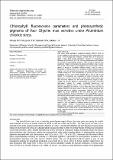| dc.description.abstract | Soil acidity limits agricultural production globally. Different kinds of
stresses, mainly Al stress, generated from acid soils affect plant growth and
result in food shortage and production. General effects of Al toxicity in
plants include plant growth alterations, reduction of photochemical
efficiency of photosystem II (PS II), reduced photosynthesis and inhibition
of synthesis of photosynthetic pigments. There is need to improve food
security in Kenya by encouraging the growing of soybean crop, however
there is lack of information on physiological response of soybean varieties
grown in Kenya to aluminium chloride toxicity. There is need to
investigate the effects of aluminium toxicity to soy bean Varieties (Glycine
max (L.) commonly grown in Kenya with a view of identifying the tolerant
varieties among them to be recommended for growing in areas prone to
aluminium toxicity. Such varieties include SB 97, SB 19, SB 20 and
SB123. The experiment was conducted at Maseno University under
greenhouse conditions. Randomized complete block design factorial was
used with three replicates and five levels of 0(control), 25mg/l, 50 mg/l,
75mg/l and 100 mg/l aluminium concentration in tap water. Parameters
determined included dry weight, chlorophyll fluorescence and
photosynthetic pigment contents. SAS software was used to analyse the
data by subjecting it to ANOVA. Tukey`s HSD tests at 5% was used to
separate treatment and Variety means. Plant dry weights decreased with
increased aluminium chloride concentration. Variety SB 123 had the
highest dry weight compared to the other three soy bean varieties.
Generally maximum quantum yield (Fv/Fm ratio) and Effective quantum
yield (ɸPSII) reduced with increasing aluminium chloride concentration in
all the varieties. Maximum quantum yield and effective quantum yield,
and chlorophyll a and b contents were highest in variety SB 20 but
measured low NPQ values. Variety SB 123 had higher carotenoids
contents at 100 mg/l aluminium chloride solution in comparison to other
three soybean varieties. Photochemical parameters of PSII and
photosynthetic pigments parameters measured were found to be quite
sensitive to AlCl3 solution stress. Soybean varieties SB 20 and SB 19 were
found to be more tolerant to aluminium chloride solution stress under the
current study. | en_US |

